County Board Handles Budget, Policy Items
Washtenaw County board of commissioners meeting (March 19, 2014): Budget and finance issues were the focus of several items at the March 19 meeting, including a report that the county saw a $3.92 million surplus for its general fund in 2013. The county’s fiscal year is the same as the calendar year. Total general fund revenues were $105.797 million, with total expenses of $101.876 million.
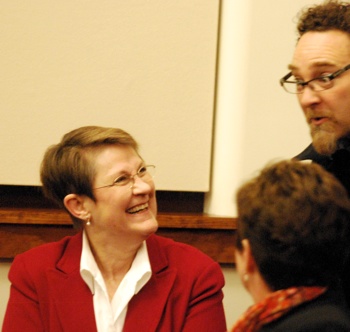
Pat Kelly, former Dexter Township supervisor, talks with county commissioner Conan Smith and finance director Kelly Belknap before the March 19, 2014 county board meeting. The board passed a resolution of appreciation for Pat Kelly during the meeting. (Photos by the writer.)
The board also heard from county treasurer Catherine McClary, who reported that foreclosures are decreasing, as are delinquent taxes. Delinquent taxes are a leading economic indicator for both mortgage foreclosures and tax foreclosures, she noted, so the decreases are good news. Commissioners gave initial authorization to the treasurer’s office to borrow up to $30 million against the amount of delinquent property taxes in all of the county’s 80 taxing jurisdictions, an annual process.
Commissioners also authorized the county administrator to hire a contract employee who will support budget-related work this year for the county board and administration. The vote came over dissent from Rolland Sizemore Jr., who felt the work could be absorbed by existing staff.
The budget was also the focus of an update from lobbyist Kirk Profit and his colleague Gary Owen at Lansing-based Governmental Consultant Services Inc., who talked about how action in the state government might impact Washtenaw County. GCSI is the lobbyist for the county and several other local governments, including the city of Ann Arbor. Their updates included the fact that legislation has been introduced to repeal Act 88, which the county uses to levy taxes for economic development and agriculture. This year, the county has budgeted $973,000 in revenues from an Act 88 levy.
In other action, the board appointed former Superior Township supervisor Bill McFarlane to the county road commission board, to fill the seat left vacant by the recent death of long-time road commissioner Fred Veigel. The remainder of that six-year term runs through Dec. 31, 2014.
Commissioners supported McFarlane, but also discussed the possibility of changing the process so that interviews with applicants would be held at a public meeting. Yousef Rabhi (D-District 8), who as board chair makes these nominations, described the process of nominating a new road commissioner as a difficult one, and highlighted the need for a five-member road commission. Currently the road commission board consists of three members. It’s an issue that Rabhi plans to bring up at an April 17 working session.
The board also took a step toward allowing employees to get health insurance coverage for the treatment of autism. Commissioners gave initial approval that would authorize adding an Autism Spectrum Disorder (ASD) rider to existing active employee and retiree benefits.
And a resolution to oppose a mineral mining operation in Lyndon Township drew criticism from Dan Smith (R-District 2), who objected to the county board weighing in on an issue that’s not within its purview. Other commissioners felt the county had a vested interest in formally voicing an opinion, both because of broader economic and environmental impacts that would affect residents, and because the county parks & recreation commission owns property in the township. Smith’s decision to state “present” – rather than casting a yes or no vote – resulted in brief discussion about board rules.
Lyndon Township Mineral Mining
A resolution opposing a mineral mining proposal in Lyndon Township appeared on the March 19 agenda.
The resolution stated that the county board “formally opposes the establishment of the proposed McCoig Materials mining operation in Lyndon Township on the basis of the very serious negative consequences to the surrounding communities.” The company is proposing a sand and gravel mine on 189 acres north of Chelsea on M-52. The rural site is located near several parks and nature areas, including Waterloo State Recreation Area, the Pinckney State Recreation Area, Park Lyndon, the Green Lake Camping area, and the Waterloo-Pinckney Hiking Trail. Over 31,000 acres of protected land is located in that area.
McCoig is asking Lyndon Township for special land use zoning and has submitted an application for a mineral mining operation. Public hearings on the issue have drawn heavy opposition. On its website, the township has noted that its authority is limited:
Michigan State Legislators have greatly reduced township control by passing Act 110 of 2006 (125.3205). Under that law, the township must not “prevent the extraction, by mining, of valuable natural resources from any property unless very serious consequences would result from the extraction of those natural resources. Natural resources are considered valuable for the purposes of this section if a person, by extracting the natural resources, can receive revenue and reasonably expect to operate at a profit.” The township’s authority is limited to “reasonable regulation of hours of operation, blasting hours, noise levels, dust control measures, and traffic that are not preempted by part 632 of the Michigan environmental laws,” 1994 PA 451, MCL 324.63201 to 324.63223.
The county board’s resolution addresses these issues, stating in its “whereas” clauses that “the noise, dust, air pollution, and additional heavy traffic generated by the operation of the mine and the transportation of the minerals will likely have serious negative consequences for the natural environment and wildlife …” [.pdf of full resolution]
The issue was also raised during the March 11, 2014 meeting of the Washtenaw County parks & recreation commission. WCPARC director Bob Tetens subsequently sent a letter to Lyndon Township supervisor Mark Keezer outlining several concerns with the project. [.pdf of Tetens letter] The letter indicates that WCPARC is willing to purchase the property.
Lyndon Township Mineral Mining: Public Commentary
A resident of Lyndon Township spoke during public commentary, saying he’s not anti-mining. “But my mama taught me there’s a right place for everything, and in the heart of the largest state recreation area in the lower Peninsula is not the right place.” He strongly encouraged commissioners to pass the resolution and to do everything in their powers to support the citizenry, “who I can tell you is very strongly against this.”
Larry Murphy, a Scio Township resident, told commissioners that he’s a candidate for the county board. [Murphy, a Republican, has filed to run for the Aug. 5 primary in District 1. The seat is currently held by Democrat Kent Martinez-Kratz, who is running for re-election.] Murphy said he attended the public meeting earlier in the month about this proposal, which was held by the Lyndon Township planning commission. He said he was shocked that about 500 people attended. It’s really a disaster in terms of the environment and the effect on recreation, Murphy said. It’s also a disaster in terms of transportation, because of the trucks that would be going through downtown Chelsea. He encouraged the board to oppose this project. He wanted people to know that opposition to this is bi-partisan. “This mining company, McCoig, has no support, no friends in Washtenaw County,” Murphy concluded.
Lyndon Township Mineral Mining: Board Discussion
Kent Martinez-Kratz (D-District 1) – who represents the county district that includes Lyndon Township – described the situation, noting that the mining would directly affect a county park. Park Lyndon shares a lake with the proposed sand mine, he noted, and the company plans to use water from the lake as part of its mining operation. He pointed to the letter by Bob Tetens, director of the county parks & recreation commission, as giving a good explanation of the objections. Martinez-Kratz also noted that about 700 people had attended two public meetings in the township, overwhelmingly opposed to this proposal. He thought the community would appreciate the county’s opposition.
Dan Smith (R-District 2) spoke about process and the county board’s role. “It seems that this board simply can’t mind its own business. Here we are, yet again, sticking our nose in someone else’s business.” This is a matter for Lyndon Township to decide what’s best for them, he said. The planning commission is holding public hearings and getting lots of public comment. The planning commission will review that public comment, as well as the advice from their attorneys, and make a decision. The township board will subsequently weigh in as well. If voters are unhappy about that, they have a right of referendum, Smith noted. Residents can circulate petitions and perhaps overturn whatever decision is made. If a lawsuit occurs, it will be the taxpayers of Lyndon Township who’ll be paying for it, he noted.
It’s not the job of the county board to sort out these issues, Smith said. This isn’t under the county’s control, he added, “and I wish you would stop having things in front of us that are not under our purview.” [In general, Smith has consistently objected to resolutions weighing in on issues – usually at the state level – that are outside the purview of the county board.]
Conan Smith (D-District 9) said he appreciated Dan Smith’s position that the township board will be making the decision. But Washtenaw County is a significant landowner in Lyndon Township, he noted, with properties including Park Lyndon and West Lake Preserve. The resolution that the board is considering plainly articulates the impacts on natural resources as being the main driver of the county’s concern, C. Smith said. The township is gathering public opinion, and the county as a landowner has an interest in that land and the possible impacts of the mining facility. “It’s right for us to articulate our concerns,” he said. The resolution doesn’t carry any more weight than other landholders, he said, and he supported it.
Rolland Sizemore Jr. (D-District 5) asked whether the Lyndon Township board supported or opposed the mining proposal. Yousef Rabhi (D-District 8) didn’t think the township board had made a determination – that’s why they’re soliciting public comment. Sizemore wondered what the county board’s resolution would do. Rabhi replied that it expresses the board’s opposition to the mining operation.
Sizemore said Dan Smith had a point about it being the township’s business. But Sizemore noted that he served on the county parks & recreation commission, which has a lot of land there, so he’d support the resolution. [Dan Smith and Conan Smith also serve on the parks & recreation commission.]
Rabhi thanked Martinez-Kratz for advocating on this issue. Rabhi noted that his own personal interest in it stems from his background in environmental studies. He’s heard from people at the University of Michigan that they also have concerns about this project. Rabhi called Tetens’ letter well-stated, outlining many concerns that people share. It’s a community-wide issue, he said, not just isolated to the township. Lyndon Township is within Washtenaw County, and the county has a duty to take a stance on this – because the environment in the county is a countywide asset to all citizens. “We are doing the right thing by passing this resolution in opposition of the mining operations in Lyndon Township,” Rabhi said. It should be a concern for all of Washtenaw County.
Dan Smith countered that if the state wanted the county board to have control over land use, then the legislature could amend the zoning enabling act. In some states, land use is a county matter, he said. If that were the case, then the question of this mining operation would rightfully be before the county board, and it would make the determination.
The proper response, D. Smith continued, is in Tetens’ letter, where Tetens indicated the willingness of the parks & recreation commission to buy the property. It makes perfect sense for natural areas preservation, he said.
Martinez-Kratz thought the state would want the county board to advocate on issues that are important to the county. This issue is important for economic and environmental reasons, he said. It won’t be resolved quickly, and he thought that township officials would look for guidance from the county as well as from the township residents.
Outcome: The resolution passed. Alicia Ping (R-District 3) was absent, and Dan Smith (R-District 2) stated “present.”
Lyndon Township Mineral Mining: The Vote – Coda
Kent Martinez-Kratz asked corporation counsel Curtis Hedger for clarification about how Dan Smith’s vote would be recorded. The board rules state that a commissioner must vote yes or no unless there’s a conflict of interest, but Hedger noted that there’s no mechanism to enforce the rule.
Hedger said he did some research, because Smith had indicated that he would be making the “present” statement. It will be recorded that Smith stated “present,” Hedger said. But because it takes an affirmative vote to approve a resolution, then anything else is considered a “soft no.” Yousef Rabhi recommended making a note next to the vote, indicating that it’s not in keeping with the board rules.
Specifically, the board rules – as adopted unanimously by commissioners at their Jan. 8, 2014 meeting – state:
O. VOTING:
Every member who shall be present, including the Chair, when a motion is last stated by the Chair, and no other, shall vote for or against the motion unless the member has a conflict of interest, in which case the member shall not vote.
1. Roll Call Vote:
Roll call vote shall be taken when called for by any member of the Board, and on board actions to adopt ordinances, resolutions and the appointment or election of officers.
2. Votes Required:
Procedural and other questions arising at a meeting of the Commissioners, except for those decisions required by statute or by these rules (Specifically, Rule II F – Closing Debate in Committees and Rule III R – Suspension/ Amendment or Rescission of Board Rules) to have a higher majority, shall be decided by a majority of the members present. A majority of the members elected and serving, however, shall be required for the final passage or adoption of a motion, resolution or allowance of a claim.
Ronnie Peterson noted that commissioners are individually elected, and they can choose to vote or not vote. Every commissioner stands by their individual commitments to vote, he said. The resolution passed with majority support, he noted. The board establishes its practices and norms by example, Peterson said. Whatever the board finds acceptable is how it will function, regardless of what the official rules state, he added. “I don’t like that, but we’ve established that in the past.”
Appointments
At the board’s March 19 meeting, Yousef Rabhi (D-District 8) made nominations to six county committees, commissions and boards. [.pdf of application packet] Nominations are made by the board chair, with confirmation of the appointments made by a vote of the full board.
Appointments: Road Commission Board
Yousef Rabhi nominated former Superior Township supervisor Bill McFarlane to the Washtenaw County road commission board, to fill the seat left vacant by the recent death of long-time road commissioner Fred Veigel. The remainder of that six-year term runs through Dec. 31, 2014. Unlike most other county-appointed boards, road commissioners receive annual compensation of $10,500.
McFarlane was among 10 applicants for the position. Others who applied included former county commissioner Rob Turner; Mike Henry, chair of the Ann Arbor Democratic Party; and University Bank CEO Stephen Ranzini.
During the evening’s first opportunity for public commentary, Ken Schwartz – a former county commissioner, former road commissioner and current supervisor of Superior Township – spoke briefly in support of McFarlane’s appointment. He noted that McFarlane was very experienced in local government. McFarlane had served as Superior Township’s supervisor for 22 years and before that worked for the sheriff’s department. “Bill is more than qualified to step in,” Schwartz said. McFarlane has worked with municipal budgets, and understands the difference between primary roads and local roads. He’d be an excellent choice, Schwartz concluded.
Conan Smith (D-District 9) said he was glad that McFarlane would be back working for the county. He described McFarlane as very bright and “super genial,” and as someone who is trusted by the communities that are impacted by decisions of the road commission.
Ronnie Peterson (D-District 6) described McFarlane as a personal friend, and said there was no question about his integrity. He was pleased that McFarlane was willing to serve, and he supported the nomination.
However, Peterson said he was concerned about following proper procedures, and that the board hadn’t always done that. In the past, they’d gotten rid of a 24-year veteran on the road commission, Peterson said, “through a process that was very questionable.” [Peterson didn't mention any names, but was possibly referring to Steve Puuri, who retired as managing director of the road commission in 2011 after nearly 25 years.]
Following the rules and procedures is the only way that people know that something is being done in a fair, consistent way, he said. Peterson questioned why there hadn’t been public interviews of potential candidates to the road commission board.
Peterson also said he hadn’t yet heard about the recommendations regarding the future of the road commission, which a board subcommittee had undertaken. He wanted to have some discussion about that. If the nomination were anyone else besides McFarlane, Peterson said he might not vote for that person, because he didn’t think the process had been fair, clear or consistent.
Conan Smith responded, saying that candidates for the road commission in the past had been interviewed, but that hadn’t happened for at least seven years. The more recent appointments to the road commission hadn’t been made that way, he noted, and perhaps the board should return to its past practice. He said he knew how rough it was for the board chair to have to make the decision.
C. Smith noted that since the current appointment runs only through the end of 2014, there would be a chance soon to implement an interview process when the county board makes an appointment for the term that begins on Jan. 1, 2015. He thought it would be very valuable for the public to have input.
Rolland Sizemore Jr. (D-District 5) said he supported McFarlane. He disagreed with Peterson and C. Smith, saying that citizens elected the county commissioners so that the commissioners would make decisions. It’s the board’s job to make these appointments, he said, not to set up an advisory committee to make recommendations. He thought the board was letting go of its authority, and letting residents decide “when they don’t know a third of the story.”
Andy LaBarre (D-District 7) noted that the road commission would be the topic of an April 17 working session, which he chairs. He suggested continuing discussion of the issue at that time. The working session will also include a report from the subcommittee that is making recommendations on the future of the road commission. [For additional background, see Chronicle coverage: “No Major Change Likely for Road Commission.”]
Rabhi described the process of nominating a new road commissioner as a difficult one. He appreciated the diversity of backgrounds among the applicants. He said he called all 10 applicants for 15-30 minutes or more, to talk about their interests and qualifications. “It was a very hard and stressful process for me.” McFarlane has the qualifications necessary to fill this vacancy, Rabhi said, and he was happy to put his name forward.
Rabhi said it would be great to find a way to engage all the applicants, who are passionate about roads and road funding. Perhaps there’s a way to do that in an ongoing basis, he said.
Noting that this might be extremely controversial, Rabhi then said the county needs a five-member road commission. Currently the road commission board consists of three members. “This process highlighted that need” to expand, he said. With five members, the road commission would have more representation from more backgrounds and more parts of the community. That would result in a more productive dialogue than three commissioners can have, Rabhi said, especially given the restrictions of the state’s Open Meetings Act.
It’s an issue that Rabhi plans to bring up at the April 17 working session.
Rabhi said he’d love to hear about how the public interview process has worked in the past, noting that he wasn’t on the board when those kind of interviews occurred. He’d like to review that process, as long as it’s not taking away the decision-making from the board.
In this case, given the vacancy and the need for a full road commission board, a new commissioner needed to be appointed quickly, Rabhi said. He again stressed that he’d spent a lot of time talking to applicants as well as to fellow county commissioners, to get their input. He hoped the board would support McFarlane.
Sizemore wanted to know when the county board could change the pay of the road commissioners. Corporation counsel Curtis Hedger said it can’t be done during a road commissioner’s current term. It would have to be done and take effect at the beginning of the new term. Sizemore said that if the road commission board is expanded to five members, perhaps the salary should be reduced to $6,000 each. Hedger pointed out that there would be varying salaries for a period, because the terms for the road commissioners are staggered.
Peterson said he didn’t know where the idea of having a citizens advisory committee had come from, and emphasized that the appointments are made by the board. Whatever process is put in place should also be decided by the board, he said.
Outcome: Commissioners unanimously appointed Bill McFarlane to the Washtenaw County road commission.
Later in the meeting, Ronnie Peterson asked whether expanding the road commission to five members would actually mean dissolving the existing road commission and establishing a new one. He asked corporation counsel Curtis Hedger to research that question. He said he wasn’t advocating for it, and joked that he hoped people wouldn’t call him about it.
Yousef Rabhi also suggested that the board might consider designating positions on the road commission board based on specific skills – like community outreach, or technical expertise – so that there’s more diversity of background, especially if the road commission board is expanded to five members. It might even include geographic designations, he said. That might be something else that Hedger could explore.
In general, Rabhi said he wanted to move road commission appointments away from being political and more toward being policy-driven.
Appointments: Other Commissions & Committees
Yousef Rabhi made several other nominations on March 19:
- Accommodations ordinance commission, for a term ending Dec. 31, 2014: Andy LaBarre (D-District 7).
- Agricultural lands preservation advisory committee, for a term ending Dec. 31, 2014: Erica Bloom (environmental/conservation group/natural resources professional).
- Workforce development board, for terms ending Dec. 31, 2016: John Haberthy (private sector) and Matthew Sandstrom (private sector).
In addition, five nominations were made to the Act 88 advisory committee, for terms ending Dec. 31, 2014. Three county commissioners – Conan Smith (D-District 9), Alicia Ping (R-District 3) and Ronnie Peterson (D-District 6) – were appointed, along with citizens Todd Clark and Art Serafinski.
Action on appointing the Act 88 advisory committee had been originally considered at the board’s Feb. 19, 2014 meeting. The item was postponed after Ronnie Peterson (D-District 6) raised concerns over the policy governing the committee’s role. The committee had been created at the board’s Nov. 6, 2013 meeting, as part of a broader policy to help the board allocate revenues levied under Act 88 of 1913. No appointments had been made at that time, however. The county levies the tax to fund economic development and agricultural activities, including Ann Arbor SPARK. [.pdf of March 19 staff memo on Act 88]
Outcome: All appointments were approved by the board.
Staff for Budget Work
Commissioners were asked to give final approval to a proposal to hire a contract position that would support budget-related work for the county board and administration. The item had been originally considered, but postponed, at the board’s meeting on Feb. 5, 2014. It was subsequently given initial approval on March 5, 2014.
This process started on Nov. 20, 2013 meeting, when commissioners gave direction to county administrator Verna McDaniel to research and recommend staffing options that would support the board’s community investment priorities. As part of adopting a four-year budget, the board set up a new strategic model to help it determine where the county’s resources should go. The board set goals as well as outcomes that are intended to measure how those goals are being achieved.
The priority areas for investment that were approved by the board in 2013 are: (1) ensure community safety net through health and human services, inclusive of public safety; (2) increase economic opportunity and workforce development; (3) ensure mobility and civic infrastructure for county residents; (4) reduce environmental impact; and (5) ensure internal labor force sustainability and effectiveness.
The dollar amount for this position wasn’t included in the resolution, which stated that “compensation shall not exceed the scope of the Administrator’s authority.” The administrator has discretion to spend up to $50,000 on professional services contracts, and up to $100,000 for any proposed goods, services, new construction or renovation. [.pdf of staff memo and resolution] A four-page job description had been included in the Feb. 5 board packet. The person would report to the county administrator in terms of daily operations. [.pdf of job description] [.pdf of scope of services]
The issue was debated at some length during the board’s Jan. 22, 2014 meeting, when commissioner Ronnie Peterson (D-District 6) questioned the process for hiring this kind of staff support. On Feb. 5, several commissioners expressed concern about spending money on this position and wanted more details about funding and duties, which led to the postponement. There was no discussion about the item on March 5, when it was given initial approval on a 7-1 vote, over dissent from Dan Smith (R-District 2). Rolland Sizemore Jr. (D-District 5) had been absent.
Staff for Budget Work: Board Discussion
On March 19, Ronnie Peterson asked for the item to be pulled out for a separate vote. He said he supported the staff position, but wanted to clarify some things. He joked that the chair, Yousef Rabhi, “took me to the back room, to make sure I did not waver.”
Peterson referred to the following “whereas” clause, highlighting a reference to the board leadership:
WHEREAS, upon approval, the Administrator is directed to work with Board Leadership to contractually engage a qualified professional to assist the BOC to develop strategies and provide oversight for the integration of Board-defined community impacts and outcomes into organizational and departmental programs, policies and budget priorities and;
Peterson said he wasn’t part of the board leadership, and he wanted to know how they perceived the role of this new employee. [The leadership includes board chair Yousef Rabhi; vice chair Alicia Ping; Felicia Brabec, chair of the ways & means committee; and Andy LaBarre, chair of the working sessions.] How would the communication flow from the leadership to the rest of the board? Peterson asked. He noted that the new staff person would be under the supervision of the county administrator, but would report to the board.
Felicia Brabec said that the “whereas” clause relates to hiring the person, and she encouraged all commissioners to be involved in that process. She was open to changing “board leadership” to simply “the board.”
Regarding the flow of information, Brabec said the person would regularly come to board meetings to update commissioners about the work. That way, commissioners would be on the same page when they needed to make decisions for the budget reaffirmation later this year, she said.
Rabhi supported an amendment to strike the phrase “to work with Board Leadership.” But Conan Smith said he thought the board should be involved in the hiring. Peterson agreed, saying the board should be very open about this hiring, and should let other employees know what this person will be doing. The role should be clearly defined, he said. Peterson agreed that the entire board should be involved, not just the leadership.
The proposed amendment changed the “whereas” clause to state [emphasis added]:
WHEREAS, upon approval, the Administrator is directed to work with the Board to contractually engage a qualified professional to assist the BOC to develop strategies and provide oversight for the integration of Board-defined community impacts and outcomes into organizational and departmental programs, policies and budget priorities and;
Outcome on amendment: On a voice vote, commissioners approved the amended “whereas” clause.
Rolland Sizemore Jr. wondered whether in the future he should contact county administrator Verna McDaniel, or the new staff person that would be hired. He was skeptical about the need to hire someone new. “We’ve already got 1,300 employees, but you guys feel we need to hire somebody else to do Verna’s job, and Verna’s job is to tell somebody on her staff to get some work done.”
Sizemore also asked why there were no dollar amounts specified in the resolution for this new hire, or a timeframe for this work. Finally, he asked whether the county would also need to hire someone to implement the recommendations made by the new employee. He didn’t support the hire, saying that the county already had staff who could do this work.
Brabec and McDaniel clarified that the contract would likely be between $50,000 to $75,000, and would not exceed the amount that the county administrator is allowed to spend without board approval – a $100,000 limit. In terms of a timeframe, McDaniel said it would likely be a contract at least through 2014. The board would need to decide whether the work would continue beyond that, she said.
Sizemore noted that not long ago, the county was poised to borrow up to $350 million “because we were in such desperate straits,” but now there’s money to hire someone new. He would not support the resolution. [Sizemore was referring to a bond proposal that had been floated in early 2013 to cover unfunded pension and retiree healthcare obligations. McDaniel had initially said the bond was crucial to the county's financial health, but the proposal was dropped in July of 2013 amid concerns over cost and process, as well as uncertainty related to the state approval process that was required for this type of bonding.]
Outcome: The resolution on hiring a contract employee for budget work passed on a 6-1 vote, over dissent from Rolland Sizemore Jr. Dan Smith was out of the room when the vote was taken, and Alicia Ping was absent.
Autism Coverage
Andy LaBarre (D-District 7) brought forward a resolution from the floor, authorizing the county to provide health insurance coverage for the treatment of autism. The resolution would authorize adding an Autism Spectrum Disorder (ASD) rider to existing active employee and retiree benefits. [.pdf of staff memo and resolution]
Adding the rider would cost the county an estimated $182,589 this year, according to staff – to be paid to Blue Cross Blue Shield of Michigan. To cover that cost, each county department will be charged on a per-employee basis. In addition, the county will pay for claims made by employees for this benefit, with the assumption that most if not all claims would be reimbursed by the state. LaBarre described the amount of claims that the county might be required to pay as a “moving target, but one I think we can meet.” He said the policy is needed for employee recruitment and retention, as well as for the “basic moral argument” that coverage should be provided.
The board has been discussing this possibility for several months. LaBarre noted that Conan Smith (D-District 9) had brought up the issue last fall, pointing out that the county didn’t provide full mental health parity. That was because of budgetary constraints, LaBarre said.
At its Jan. 22, 2014 meeting, the board received a staff presentation about the possibility of offering such coverage. Colleen Allen, CEO of the Autism Alliance of Michigan, attended that meeting to answer questions and advocate for coverage. The board created a committee to explore the cost to the county for providing employee health insurance coverage for autism. Committee members were LaBarre, Felicia Brabec (D-District 4), and Ronnie Peterson (D-District 6). The committee’s charge was to (1) investigate the cost and sustainability of coverage of autism spectrum disorders; and (2) recommend a policy providing and funding coverage if the state reimbursement fund is exhausted.
The federal Mental Health Parity & Addiction Equity Act of 2008 mandates that any group plan with 50 or more members – like Washtenaw County government – must offer both medical and mental health benefits. Under more recent federal health care reform, there’s been an expansion of benefits, and mental health benefits are considered a mandatory part of basic health care, starting this year. However, autism isn’t included as part of that mental health mandate.
On the state level, in October 2012 a state of Michigan mandate took effect stating that all fully insured plans must provide coverage for the diagnosis and treatment of autism spectrum disorders (ASD). The county is not a fully insured plan, however. Because the county is self-funded, it was exempt from this state mandate.
The costs of treatment are estimated to be about $60,000 a year to cover a child with autism. The state of Michigan has made coverage a priority, and has started setting aside funds to reimburse organizations that provide coverage. In fiscal year 2012-13, $15 million was made available, with an additional $11 million in fiscal 2013-14. Of that, only about $500,000 has been expended on reimbursements. The program is handled by the Michigan Dept. of Insurance and Financial Services.
The state program provides for reimbursement of up to $50,000 per year per child between the ages of 0 to 6, up to $40,000 per year from ages 7-12, and up to $30,000 per year for ages 13-18.
County staff have estimated that offering the coverage would result in up to a 5% increase in medical expenses, or up to $1 million annually. This year, medical expenses are budgeted at about $20 million. The county is expected to be fully reimbursed by the state of Michigan for the amounts that are allowed under the autism program.
The resolution given initial approval on March 19 included two resolved clauses:
NOW THEREFORE BE IT RESOLVED that the Washtenaw County Board of Commissioners authorizes the implementation of the Autism Spectrum Disorder (ADS) rider to existing active and retiree as soon as feasibly possible through Blue Cross/Blue Shield of Michigan, providing mental health and physical health parity.
BE IT FURTHER RESOLVED that Washtenaw County commits to a review of claims paid and/or reimbursed on an annual basis as our individual experience is not yet known. Such review would occur prior to the annual review process with Blue Cross/Blue Shield to determine if such benefit (rider) would be continued in the next year of benefits.
Autism Coverage: Board Discussion
Yousef Rabhi (D-District 8) thanked the committee and staff for their work. He asked Diane Heidt, the county’s human resources and labor relations director, what percentage of costs the county could be expected to bear for this coverage.
Heidt described the annual payment to Blue Cross Blue Shield – of about $182,000 – as a kind of “permission slip” that would allow the county to offer the coverage. That amount will be pre-funded from the county’s medical fund reserves, and it will then be charged out to each county department based on the number of employees in each department – both general fund employees and non-general fund employees.
Employees that take advantage of the coverage would pay if there’s a deductible on their current insurance plan, or if there’s co-insurance, Heidt explained. The majority of employees pay 10% as co-insurance. She reminded the board that the administration is still negotiating with unions that represent about 300 employees at the sheriff’s office, so the benefits for those employees are different at this point.
The remainder of the claim would be paid by the county, with the expectation that the county would be reimbursed from the state, based on the age of the child that’s receiving treatment. The annual state reimbursement levels are $50,000 through age 6, $40,000 from ages 7-12, and $30,000 from ages 13-18.
Rabhi noted that Lansing is “a very dynamic place,” and he wondered what the impact would be if the state reimbursement program is eliminated. Heidt replied that currently about $25 million is available in the state reimbursement fund. The committee recommends that the county review the benefits and claims annually, to determine if the coverage would continue to be offered in the following year, Heidt said.
Rabhi noted that once the county offers a benefit, it’s hard to take that benefit away. If for some unforeseen reason there’s suddenly no money available from the state, he said, the county would need to evaluate if it’s a benefit that they can continue to pay for. But it’s hard to see the county removing that benefit, he said. Heidt stressed the importance of annually evaluating the county’s expenses, because at this point it’s unclear how many employees will take advantage of the coverage.
Rabhi supported offering coverage, but wanted to make it clear that it wasn’t a guarantee every year. He was concerned about what might happen if state funding disappeared, and what impact that would have on employees as well as on the county budget. He also noted that a lot of the county’s departments that get funding primarily from non-general fund sources are short on cash. What kind of burden will this coverage place on those departments? Heidt replied that of the $182,000 total, about $102,000 of that will be charged to non-general fund departments, based on the number of employees in each of those departments.
But this year, that $182,000 total would be pro-rated based on when the coverage begins, she noted – so that total amount will likely be only about $75,000 this year, since the coverage won’t be started until well into the year.
Rabhi said he wanted to be clear that the families who access this benefit aren’t a burden – that’s not what he meant. He was simply trying to understand the dollars that the county will be spending.
Conan Smith (D-District 9) asked about the $182,589 payment to Blue Cross Blue Shield, noting that it effectively doubles the cost of providing the coverage. He wondered what BCBS was doing with that money. Heidt replied that BCBS is charging that amount in anticipation of the claims that might be made. Based on whatever the county’s actual experience is with autism claims, that annual payment to BCBS might be less in the following year, she said. Smith asked what the dollars are used for within the insurance company. County administrator Verna McDaniel said that the basic understanding is that the money goes into an insurance pool, but beyond that, it’s not clear how it is allocated.
Smith said the issue of autism coverage didn’t arise because there’s state funding available for reimbursement. It came up because of the desire for mental health parity, and because many commissioners thought the county already provided autism coverage and were surprised when that wasn’t the case. Every other mental health issue is covered. Heidt noted that autism is the only mental health issue that doesn’t have coverage mandated by the state. Smith wondered how it’s possible that this relatively minor coverage is costing the equivalent of $15 per employee per month to add to the county’s health care costs. Heidt said it’s probably because there are so many unknowns.
Smith asked how the cost of the autism rider compares to other riders that the county has with BCBS. Heidt said it’s been a long time since the county added a new rider, so she didn’t have those costs broken out. Smith replied that he “loved the Blues” and has been covered by that entity his entire life. But he wanted some sort of explanation about how BCBS calculates the autism rider. Heidt said she’d talk to the county’s BCBS agent to get more information.
LaBarre agreed with Rabhi about the county needing to go into this with “our eyes wide open.” The county can leverage state funds now, but it’s not a given in the future. LaBarre noted that some commissioners wonder why this isn’t being done as part of the budget reaffirmation later this year. It’s not without risk in terms of cost, he said, but the merits of doing it as soon as possible make it worth supporting.
Ronnie Peterson (D-District 6) said he hoped the county never takes back the benefits offered to employees. They should figure out how to finance this benefit, regardless of state aid. It’s about making a commitment to employees who have made previous sacrifices, he said.
Dan Smith (R-District 2) said he was happy to move this item forward for an initial vote. But because of the budgetary impacts it has, and the fact that the county is barely three months into a four-year budget, he hoped that it would come back to the board for final approval not on April 2 but rather as part of the board’s budget reaffirmation process later in the year. At that time, they’d have a better handle on the county’s finances for the year and how the county could fund this benefit, he said.
Felicia Brabec (D-District 4) thanked the staff for working on this issue, saying it was important to “right this wrong.” She agreed that it was important to figure out how to pay for the benefit if the state fund is eliminated, but it’s important to move this forward so that families who need this benefit can access it.
Brabec noted that Heidt is working on how families can get coverage for older children, from ages 18-26, who aren’t eligible for reimbursement from the state.
Outcome: Commissioners unanimously gave initial approval to offering autism coverage.
2013 Year-End Financial Update
County administrator Verna McDaniel introduced the year-end financial update by telling commissioners that “I think you’ll be pleased.” [.pdf of financial update]
Tina Gavalier, the county’s finance analyst, delivered the report. She noted that the audit is still in progress so these are preliminary results. It’s unlikely that anything will change drastically, she added.
The county had a projected general fund revenue surplus of $2.356 million for the year. Surpluses in several areas contributed to that result, including intergovernmental revenue ($1.3 million, primarily due to payments in state revenue-sharing), fees and service revenue from the county clerk/register of deeds office ($591,000), and the sheriff’s office ($495,000).
On the expenditure side, the county spent $1.564 million less than budgeted. The bulk of that comes from $1.338 million in personnel savings from attrition, position vacancies, and planned reductions. Over $1 million of that was in the sheriff’s office, Gavalier reported, where there are 25 vacancies.
The total year-end surplus for the general fund was $3.92 million. Total revenues were $105.797 million, with total expenses of $101.876 million.
Looking ahead, Gavalier noted that there are several areas to monitor, including child care fund expenditures that are rising due to caseload and placements. [The child care fund is a joint effort between state and county governments to fund programs that serve neglected, abused and delinquent youth in Michigan. Fifty percent of the fund comes from state dollars.]
Other issues to watch that could have a financial impact include fringe benefit projections and trends, personal property tax reform, the possible legislative repeal of Act 88, and state revenue-sharing/county incentive program payments. Regarding Act 88, Gavalier noted that the county has budgeted $973,000 in revenues from an Act 88 levy in 2014, to fund economic development and agricultural-related programs. “So if that’s repealed, there are some decisions that will need to be made,” she said.
Gavalier outlined the next steps for budget-related action that involves the board. The 2014 equalization report will be presented in April, along with a year‐end audit and financial statement. Quarterly budget updates for 2014 will occur in May, August and November. And this fall, the board will make a budget affirmation, with possible amendments to the remaining years of the four-year budget that was adopted in late 2013, for the period from 2014 through 2017.
McDaniel told the board that the county was recently notified that it’s receiving a national Alliance for Innovation award for its four-year budget. [Former Washtenaw County administrator Bob Guenzel previously served on the board of that group, which is based in Phoenix.]
2013 Year-End Financial Update: Board Discussion
Conan Smith (D-District 9) asked Tina Gavalier for more details about the intergovernmental revenue line item. She replied that the surplus of about $1.3 million comes from combining federal, state and local government revenues going into the general fund. Most of that came from a $1.495 million surplus in state revenue-sharing. The county received $9,602,028 in state-revenue sharing in 2013, compared to the budgeted amount of $7,665,098. The $1.495 million surplus in state-revenue sharing was offset by a $238,046 shortfall in local government revenue.
The $1.495 million in state revenue-sharing reflects the first two payments for 2014 that were actually made in October and December of 2013. There will be six payments in total for 2014, including those two, she said, but the payments that were made in 2013 had to be recorded in that year. She described it as a “one-time windfall.”
Kelly Belknap, the county’s finance director, pointed out that the state and county are on different fiscal years. The state’s fiscal year runs from Oct. 1 through Sept. 30. The county uses a calendar year as its fiscal year. That difference resulted in the timing of the payments, she explained, and the way in which they are accounted for in the county’s budget.
Gavalier also noted that the state Dept. of Treasury issued a guidance letter (No. 2013-1) stating that revenue-sharing is no longer based on statewide sales tax revenue, but instead will be a state appropriation.
C. Smith asked that the upcoming steps in the budget schedule reflect a supplemental budget update in the May-June timeframe, to reflect the updated revenue projections that will be coming in the equalization report. The board would be looking to adjust the budget at that time, based on any revenue shortfall or surplus. When Gavalier replied that it would be part of the budget update in August, Smith stressed that it should happen earlier – in May or June.
Outcome: This was not a voting item.
Delinquent Tax Borrowing
In an annual action to help the cash flow of local governments in Washtenaw County, the county board was asked to give initial authorization to county treasurer Catherine McClary to borrow up to $30 million against the amount of delinquent property taxes in all of the county’s 80 taxing jurisdictions. [.pdf of delinquent tax resolution]
The estimated amount of delinquent taxes is lower than in recent years, possibly reflecting a recovering economy. Last year, the board authorized borrowing up to $40 million, and the treasurer’s office ended up actually borrowing much less.
After March 1, taxing jurisdictions – including cities, townships, schools systems and libraries, among others – turn their delinquent taxes over to the county, and are reimbursed for that amount. The county treasurer then assumes responsibility for collecting these delinquent taxes. This is a standard procedure that’s conducted annually at this time of year. The borrowed funds are used for cash flow purposes, to fund operations for the first half of the year.
Under the state’s General Property Tax Act, the county treasurer is required to collect delinquent taxes. Section 87 of the act allows the county to set up a revolving fund – which was done several decades ago – so that the county can borrow the estimated amount of delinquent taxes, then pay in advance to all the taxing jurisdictions the amount that they would have collected if there had been no delinquent payments.
Dan Smith (R-District 2) thanked McClary for making this happen, saying this was very helpful to the townships and other municipalities that can get all their taxes upfront and then settle up after properties are foreclosed.
McClary noted that foreclosures are going down, “which is very, very good news.” It also appears that there will be a slight drop in delinquent taxes, she said. Delinquent taxes are a leading economic indicator for both mortgage foreclosures and tax foreclosures, so that’s also good news, McClary said. There’s also been a definitive drop in forfeitures, which is the step immediately preceding a foreclosure.
Last year, the county had authorized the treasurer’s office to borrow up to $40 million, but there ended up being only $21 million in delinquent taxes, McClary said. And only $16 million was borrowed, because there was a small reserve in the county’s tax revolving fund – about $4 million. So a small amount of self-funding is possible, she said, which saves the county money. Approximately 4% of what the treasurer’s office borrows represents either interest or fees. “So any time we can reduce the amount of delinquent tax borrowing, we’re doing a favor for the taxpayers,” McClary said.
She noted that the $4 million in the tax revolving fund is the result of a county board decision. Commissioners could decide to put that money into a capital projects fund or the county’s general fund, she said, but they’ve chosen to keep it as reserves. That helps the county when credit rating agencies make their evaluations, she said. It would help more if there were more money in those reserves, she added.
McClary noted that the county board recently approved a new way to pay off debt incurred from bonding, typically for public works projects in local municipalities. [At its Oct. 2, 2013 meeting, the board authorized the change to allow local units of government to repay bonds early via the county’s delinquent tax revolving fund. The intent is to reduce interest rate payments while posing no financial risk to the county. At the same meeting, the board approved restructuring debt held by Bridgewater Township, which owed $585,000 on $1.095 million in bonds issued in 2004 to fund a sewer system.]
The treasurer’s office agreed to loan Bridgewater Township money to pay off the bonds, with the township repaying the treasurer’s office at a lower interest rate than it was paying for the bond debt, which was averaging 4.1%. The interest rate that is being used to repay the treasurer’s office is slightly above the average weighted yield that the county was getting on its portfolio, McClary reported, “so it’s a very good deal for the county coffers as well.”
McClary also told the board that she’s been working with Evan Pratt, the county’s water resources commissioner. That office has a lot of small bond issues for drain projects, in the range of $200,000 to $400,000. Depending on the size of the issue, they might be spending as much as half of any issue on fees and interest. If the $4 million in the delinquent tax revolving fund could be raised, she said, the county would gain more stability from the credit rating agencies and would be in a position to do more internal loans. She said she hasn’t yet made a formal proposal about that, but that’s where she’s headed.
Outcome: Commissioners gave initial approval to the authorization, with a final vote expected on April 2.
Treasurer’s Report
County treasurer Catherine McClary gave a report on investments in 2013. [.pdf of 2013 treasurer's report] [.pdf of 2012 treasurer's report]
Investment earnings were $637,866 for the year. That compares with $755,681 in 2012. Fees and interest on delinquent taxes totaled $3.72 million in 2013, compared to $5.046 million in 2012. Fees for dog licenses were $62,718 last year, up from $59,748 in 2012. And income from tax searches was $23,052 compared to $31,760 in 2012.
Total cash and investments reported as of December 2013 was $145.226 million, down from $156.081 million at the end of 2012. The 2012 figure included $4.67 million in funds related to the county accommodations tax, which at that time was administered by the treasurer’s office. In October 2012, the board approved an ordinance change that shifted control over administering and enforcing Washtenaw County’s accommodation tax from the county treasurer to the county finance director.
McClary noted that the average weighted yield of the county’s investments was 0.476% in 2013, compared to the three-month Treasury benchmark of 0.07%.
McClary highlighted three other items during her remarks to the board. The social workers in her office – who work with residents with delinquent taxes – have been certified by the state Dept. of Human Services to do intakes for residents in a range of programs, including Medicaid and food stamps. Her office is also participating in the Step Forward Michigan program, which uses federal mortgage prevention funds to also prevent tax foreclosure. It’s the only state in the country to do that, she said.
Finally, McClary reported that property assessments are increasing. She told commissioners that she had prepared a brochure for residents about how to appeal their assessments.
Resolution of Appreciation for Pat Kelly
The March 19 agenda included a resolution of appreciation for former Dexter Township supervisor Pat Kelly. [.pdf of resolution]
Board chair Yousef Rabhi (D-District8) began by wishing Kelly a happy birthday.
Rabhi noted that Kelly had stepped down from her role as Dexter Township supervisor, after serving in that role for 12 years. He said he had served on many boards and committees with her, and knows that she’s someone who cares about all residents of Washtenaw County. He read aloud the resolution, which highlighted Kelly’s work on the Washtenaw Area Transportation Study, the Washtenaw County Transit Master Plan, Washtenaw County Police Services Steering Committee, and several other public entities.
The resolution also noted that Kelly “led Dexter Township’s response to a devastating tornado in 2012 and worked tirelessly and diligently to establish communication channels with affected residents, safely coordinate volunteer efforts to aid in the massive clean-up, and, with significant and important assistance from the County and Road Commission, supported and led township efforts to remove debris and fallen trees from private property at little or no cost to residents…”
Kelly was visibly emotional when she responded, saying she was touched by the recognition. Almost two years ago, she said, she’d stood at the same podium and thanked commissioners for helping her community after the 2012 tornado. “It’s been a good partnership,” she said.
Conan Smith (D-District 9) praised Kelly’s negotiating skills in representing her township as well as the entire county. When he first was elected, Smith said, the tension between the county and townships over police service contracts, provided through the sheriff’s office, seemed insurmountable. “It seemed like we were going to be at war for a generation,” he said. At one of his most frustrating moments during his first term, Smith recalled, Kelly called him and “very gently explained the interests that your colleagues in the townships had and concerns in a way that just opened my eyes to the possibility of a real partnership.” The county could not have reached a resolution without Kelly’s leadership on that issue, he said. “You’ve been a calming force in huge turmoil, and a passionate deliverer of messages without creating conflict in that process.”
Smith said he knew the county would find some way to keep her deeply engaged with policy work and community leadership.
Outcome: The board unanimously passed a resolution of appreciation for Pat Kelly.
Report from Lansing Lobbyist
Lobbyist Kirk Profit and his colleague Gary Owen at Lansing-based Governmental Consultant Services Inc. gave a presentation to the board about action in the state government that might impact Washtenaw County. GCSI is the lobbyist for the county and several other local governments, including the city of Ann Arbor.
The state budget is actually in good shape, Profit said, with about $52 billion in expenditures and a surplus of about $970 million. He commended the state legislators who represent districts in Washtenaw County, saying that they represent the local interests very well, even though they’re in the minority, as Democrats. He said it was great to have the state Senate majority leader representing part of Washtenaw County as well. [Sen. Randy Richardville, a Republican, represents District 17, which includes six southern and central townships in the county, and the city of Saline.]
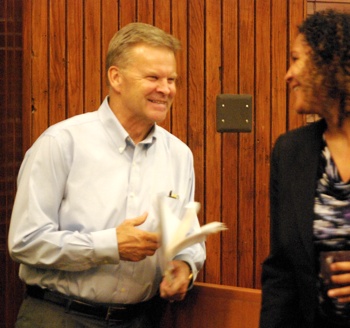
Kirk Profit, a paid state lobbyist for Washtenaw County, and commissioner Felicia Brabec (D-District 4).
Revenue sharing is moving in the right direction, Profit said. This year the county will get about $5.5 million, and he expected the county would get about $6.9 million in 2015. The state doesn’t have a good track record in terms of the county’s ability to count on state revenue-sharing, he said. It’s good to understand that going forward.
He noted that the personal property tax referendum will be on the ballot in August of 2014. [The tax is being phased out starting in 2014 through 2022. As part of that change, a statewide voter referendum is slated for Aug. 5, 2014 to ask voters to authorize replacement funds from other state revenue sources.]
Eliminating the PPT removes about $576 million statewide, which primarily are revenues that fund local municipalities. The voter referendum would authorize a use tax to be collected by a new Michigan Metropolitan Areas Metropolitan Authority, which would distribute the funding by statute.
Profit noted that TIF (tax increment finance) capture is “hot” in Lansing right now. State Rep. Eileen Kowall has drafted legislation that addresses several issues related to TIF, including the ability to opt out, resetting the base for TIF capture, and sunset clauses. “It’s going to receive a lot of attention and a lot of dialogue,” Profit said, but it wasn’t clear whether it will pass.
While noting that the state budget is in great shape, Profit said there are also some areas that have holes, including health care funding, education and roads. Some legislators would prefer to give the entire surplus back to taxpayers as refunds, he noted. Profit said he wasn’t sure how these issues will be resolved, but the legislature will be addressing these matters over the next 60-90 days.
The legislature recently approved about $215 million in supplemental funding for roads, which will bring about $1 million to Washtenaw County, Profit said. The city of Ann Arbor will get about $450,000. Other cities and villages will get much less, he said. Profit praised Gov. Rick Snyder, saying that Snyder is “right there on roads” and had demanded that the legislature produce funding for roads.
The southeast Michigan regional transit authority (RTA), which includes Washtenaw County, received close to $2 million for operating expenses to fund it until an anticipated millage vote in 2016, Profit said.
Profit told the board that Act 88 is under some attack, with legislation introduced that would repeal it. [The county’s position is that it is authorized to collect up to 0.5 mills under Act 88 without seeking voter approval. That’s because the state legislation that enables the county to levy this type of tax was enacted in 1913, which predates the state’s Headlee Amendment. The county currently levies 0.07 mills under Act 88.]
Profit said that GCSI’s Gary Owen was working aggressively to make sure legislators understand the significance of Act 88 funding for Washtenaw County. Profit said the target of the repeal legislation is Gratiot County.
The state’s supplemental budget included $750,000 for indigent defense, and Profit credited Washtenaw County public defender Lloyd Powell for successfully advocating for that funding.
Collective bargaining continues to draw a lot of attention in Lansing, Profit said. He also noted that GCSI is working with judge Donald Shelton and Dan Dwyer, court administrator of the Washtenaw Trial Court, on implementing e-filing statewide.
Breastfeeding in public is another issue that GCSI is following, Profit said. He noted that state Sen. Rebekah Warren introduced legislation that was passed in the Senate to guarantee a woman’s right to breastfeed in public places.
Profit also mentioned interest at the state level regarding the Freedom of Information Act and Open Meetings Act. Pending legislation “would dramatically limit your ability recoup costs that you might incur for FOIA responses, and also perhaps to dramatically limit your ability to have certain protected conversations from open meetings requirements.” Profit said GCSI would work closely with corporation counsel Curtis Hedger on that.
Profit highlighted an increase in state arts funding from $2 million to $10 million, which translates into about $590,000 coming to Washtenaw County for a variety of arts organizations.
Gary Owen of GCSI said he’d been working with Evan Pratt, the county’s water resources commissioner, regarding action at the Michigan Dept. of Environmental Quality (MDEQ) that will affect the Pall-Gelman 1,4 dioxane cleanup in Washtenaw County. The MDEQ is updating its cleanup standards, and Mike Gebhard has been participating in that process and is on the MDEQ’s toxicity committee. Gebhard is a former environmental analyst/hydrogeologist with Washtenaw County who now works for the county’s information technology department.
The MDEQ will make a recommendation to the state’s Office of Regulatory Reinvention in July, which will include the new standards, Owen said, but those recommendations will be known before then. “It will most likely be a drastic difference than what it is today, but the process will determine that,” he said.
Regarding the Michigan Dept. of Natural Resources trust fund, Owen cited the county’s success in getting grants in the past few years. He credited Bob Tetens, director of the Washtenaw County parks & recreation commission, with that success, which Owen said is probably unparalleled across the state. Owen cited several grants, including $300,000 for the Rutherford Pool in Ypsilanti, $300,000 for the Ann Arbor skatepark, and over $1 million for the acquisition of 54 acres near Domino’s Farms.
Regarding the possible repeal of Act 88, Owen said GCSI is working to make sure that Washtenaw County’s interests are addressed.
Report from Lansing Lobbyist: Board Discussion
Dan Smith (R-District 2) said the comments regarding Act 88 are “misplaced.” It’s not about what the money is spent on in Washtenaw County, he said. “It’s about how the money is collected, and what the law says that money can be spent on.” In his opinion, Smith said, the Washtenaw County board hasn’t done its proper due diligence, “despite my repeated requests.”
Regarding roads, D. Smith noted that legislation has been introduced to repeal the sunset clause on the ability of a county board of commissioners to absorb the duties and responsibilities of a road commission. He asked for a prognosis of that bill. Kirk Profit replied that the outcome is hard to read. GCSI will continue to watch it, but Profit didn’t think legislators had made up their mind yet.
D. Smith noted that a subcommittee of the board had recently finished a process regarding what the county would do, but the recommendation hadn’t yet been brought forward to the full board. A working session on that is scheduled for April 17. But Smith’s take on the bill is that it would provide the board with a lot of tools, while forcing the board to dramatically alter things right now. It would be productive to have a longer time to discuss how to best manage this critical transportation infrastructure, he said, noting that it’s not something that can quickly be decided. People are very resistant to change, Smith said, and need more time to work on it. He hoped the legislature would repeal the sunset clause.
Conan Smith (D-District 9) agreed with Dan Smith on the road commission issue. Removing the sunset wouldn’t mean that the county would get rid of the road commission, he said. Statewide, not many counties have taken advantage of the current ability to do that. But he hoped that option would be made available for a longer period.
Regarding Act 88, C. Smith said he had a different perspective from Dan Smith. But he thought they might agree on the fact that Act 88 is just one response that the county has to a “broken municipal finance system.” The state took millions of dollars of state revenue-sharing away from the county over the past several years. If that hadn’t happened, he said, perhaps the county wouldn’t be scraping to find other revenue sources.
C. Smith said he understood why some people want to repeal Act 88, but they should be beating the bigger drum of fixing the system. Lots of cities are on the cusp of financial insolvency, he noted, so he’d advocate not to mess with Act 88 until this bigger problem is fixed.
Yousef Rabhi (D-District 8) echoed C. Smith’s sentiments on Act 88. The county needs tools to address the needs of citizens, Rabhi said, “and right now the state is just tying our hands.” Personal property tax repeal is another example, he said. Rabhi said that Act 88 funding works and benefits the community, and he didn’t think legislators understood that.
Urban County Plan Public Hearing
The March 19 meeting included a public hearing to give input for the Washtenaw Urban County 2014-15 action plan. The hearing was set to solicit feedback about proposed projects and programs that the county intends to implement with federal funding – through community development block grant (CDBG), HOME and emergency shelter grant programs – from July 1, 2014 through June 30, 2015. [.pdf of action plan]

Computer screen: Notes being taken by Brett Lenart of the county’s office of community & economic development during a public hearing on the Urban County action plan.
The Urban County is a consortium of Washtenaw County and 18 local municipalities that receive federal funding for low-income neighborhoods. Members include the cities of Ann Arbor, Ypsilanti and Saline, and 15 townships. “Urban County” is a designation of the U.S. Dept. of Housing and Urban Development (HUD), identifying a county with more than 200,000 people. With that designation, individual governments within the Urban County can become members, entitling them to an allotment of funding through a variety of HUD programs. The Urban County is supported by the staff of Washtenaw County’s office of community & economic development (OCED).
Two HUD programs – the Community Development Block Grant and HOME Investment Partnership – are the primary funding sources for Urban County projects.
One person – Thomas Partridge – spoke during the public hearing. He said the Urban County organization is isolated, like many county organizations. Meetings are held at locations outside of Ann Arbor and aren’t televised on the Community Television Network, he said. The body should be very prominent, Partridge said, because it gets funding for affordable housing. But that funding is under attack, he noted, and more financing from the private sector is needed. Homelessness can’t be eliminated without more attention to this issue.
Thompson Block Brownfield Public Hearing
The board agenda included a resolution to set a public hearing for input on the brownfield development plan of the Thompson Block redevelopment in Ypsilanti. The street addresses for the block are 400-408 N. River St. and 107 E. Cross St. The hearing will be held at the county boardroom in downtown Ann Arbor, 220 N. Main, during the April 2 meeting, which begins at 6:30 p.m. [.pdf of staff memo]
Outcome: Commissioners voted to set the public hearing, over dissent from Dan Smith (R-District 2).
Communications & Commentary
During the March 19 meeting there were multiple opportunities for communications from the administration and commissioners, as well as public commentary. In addition to issues reported earlier in this article, here are some other highlights.
Communications & Commentary: Regional Transit Authority
Jim Casha spoke about the southeast Michigan regional transit authority (RTA). He lives in Canada, and noted that Ann Arbor reminds him of Canada – “except for the roads.”
He’d attended the recent Michigan senate transportation committee hearings in Lansing, and listened to the RTA board chair, Paul Hillegonds, ask for more money for that organization. He also attended the transportation appropriations committee meeting and heard Amtrak’s presentation about service between Chicago and Detroit, through Ann Arbor.
Casha said he’s still confused about why the RTA board isn’t making a fight for the 163-acre state fairgrounds. He’d just attended the RTA board meeting, and he thought that RTA board members are confused as well. One of the big supporters of the state legislation that created the RTA, state Sen. John Pappageorge, is a “military guy,” Casha said. “He understands that it’s always cheaper to hold what you have than to retake what you’ve lost – and there’s no reason to give up the fairgrounds.” Even if the fairgrounds turns out not to be a great property to own, though Casha said he thought it was, there’s no reason to give it up now. “We should retain it and evaluate it,” he said.
The situation is rather perilous, Casha said. He reported that Hillegonds had been surprised by the lack of knowledge that state legislators had regarding the RTA. Casha found that the same thing was true with the state fairgrounds. They pass legislation in Lansing, but then don’t keep up with its impact, he said.
Casha asked commissioners to talk with the state legislators and with Washtenaw County’s representatives on the RTA board to keep people informed about what’s happening. [The two RTA representatives from Washtenaw County, who were appointed by the county board, are Liz Gerber and Alma Wheeler Smith, the mother of county commissioner Conan Smith.] Legislators are making some serious mistakes that could seriously impact the ability to have a regional transportation system, Casha said.
Later in the meeting Casha spoke again. At the recent transportation appropriations committee meeting, the RTA presented documentation showing that state legislation allows for the RTA to generate revenue from the sale, exchange, mortgage, lease or other disposition of property acquired by the authority, he said. So his question was: Why doesn’t the RTA take advantage of it? One reason is that the RTA has been misled by people in the governor’s office, Casha contended. There was misinformation, he said, and the state fairgrounds was transferred to private individuals. “It’s definitely not a done deal yet,” Casha said. There are ways out of any legal contract, he added.
Casha noted that the Michigan Land Bank has a new director, “and maybe she has a different opinion of what the land bank’s done so far with this land.” The state owes it to the people in the four-county RTA district to look after their interests in this matter.
Communications & Commentary: Roads in Manchester
Allison Tucker of Manchester, who had spoken to the board at its Feb. 19, 2014 meeting about the GED (general education diploma), began by reporting that the Washtenaw Community College’s adult transitions program recently secured $3,000 in funding. It reinstated her faith that one person can make a difference. But she was there that night to talk about the condition of roads in Manchester. She had hoped to address commissioner Alicia Ping (R-District 3), whose district includes Manchester, but noted that Ping was absent. There are a lot of potholes, and many of them are deep, Tucker said. The situation could kill someone, she said. For smaller communities, it’s difficult to have funding for plowing and salting the roads, she noted. Tucker hoped that the county could help, so that someone like her who travels to class wouldn’t face that problem.
Communications & Commentary: Thomas Partridge
Thomas Partridge addressed the board during both opportunities for public commentary. He urged commissioners to come up with a fundamentally sustainable agenda for county government, with top priorities of eliminating homelessness, funding affordable housing and countywide public transportation, and supporting human rights. He said Washtenaw County has a programmed way of doing business that leaves out a substantial number of residents in making decisions about these issues.
Present: Felicia Brabec, Andy LaBarre, Kent Martinez-Kratz, Ronnie Peterson, Yousef Rabhi, Rolland Sizemore Jr., Conan Smith, Dan Smith.
Absent: Alicia Ping
Next regular board meeting: Wednesday, April 2, 2014 at 6:30 p.m. at the county administration building, 220 N. Main St. in Ann Arbor. The ways & means committee meets first, followed immediately by the regular board meeting. [Check Chronicle event listings to confirm date.] (Though the agenda states that the regular board meeting begins at 6:45 p.m., it usually starts much later – times vary depending on what’s on the agenda.) Public commentary is held at the beginning of each meeting, and no advance sign-up is required.
The Chronicle could not survive without regular voluntary subscriptions to support our coverage of public bodies like the Washtenaw County board of commissioners. Click this link for details: Subscribe to The Chronicle. And if you’re already supporting us, please encourage your friends, neighbors and colleagues to help support The Chronicle, too!




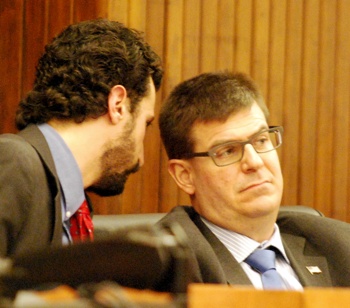
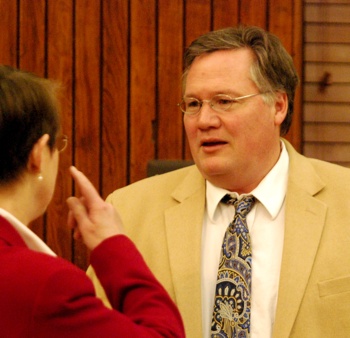

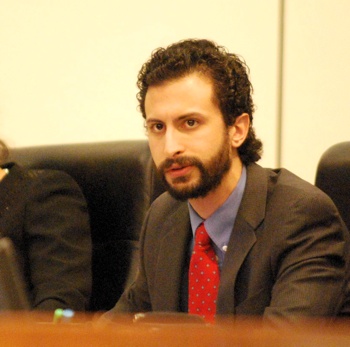
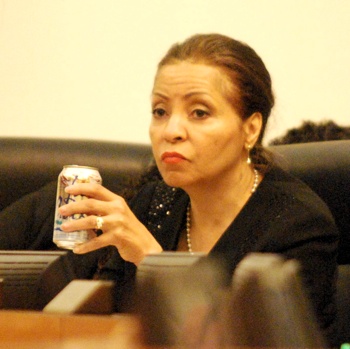
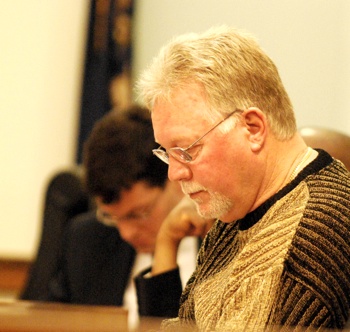
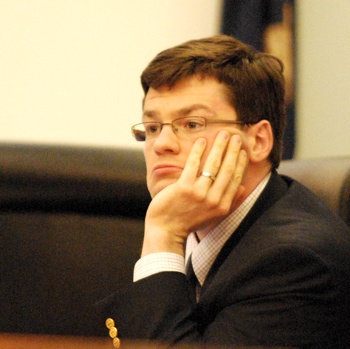

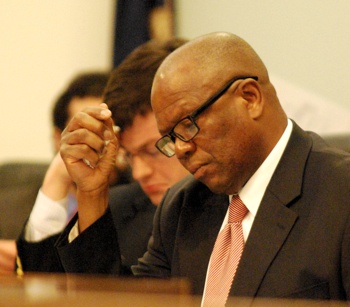
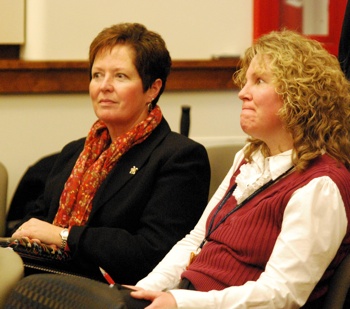
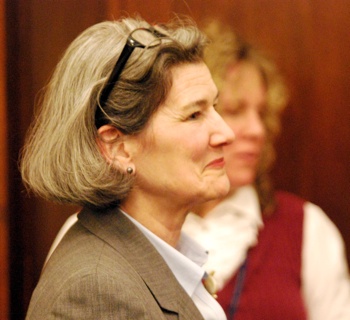
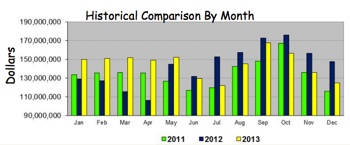
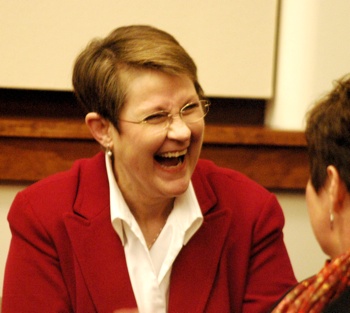
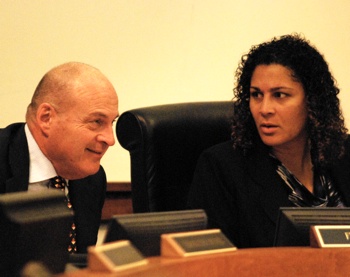
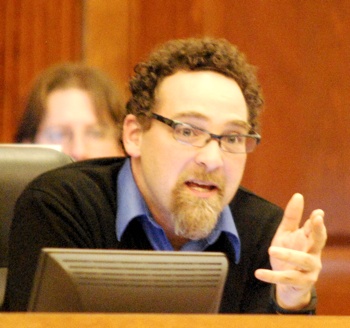
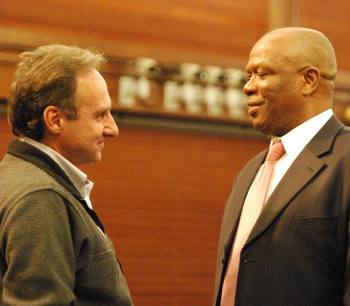
25 vacancies in the sheriff department, Ann Arbor police force way down, state police numbers in decline for decades. Hope we do not get a long hot summer, there are not a lot of officers around. Many of the active officers are demoralized and close to retirement or newly hired 100 pound girls.